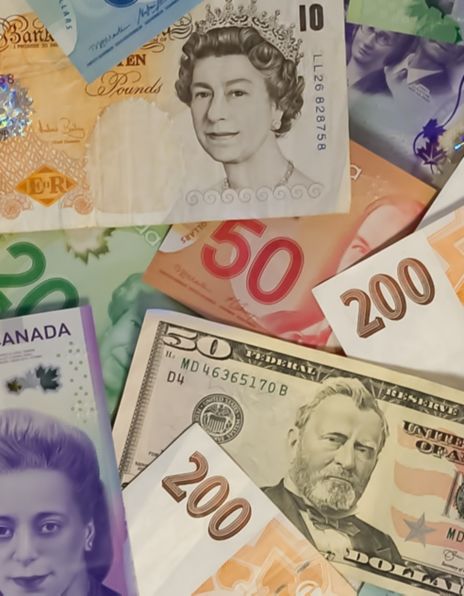Day-to-day market rates
A standardised and neutral overnight rate setting for the individual currency.

The most traded currency in the world is the USD, which is involved in well over 80 per cent of all foreign exchange trades. (Photo: John McArthur/Unsplash)
Daily quoted interest rates for different currencies
The Day-to-Day market rate is a standardised and neutral interest rate fixing for each individual currency. The rate is quoted daily at fixed times in the market for the currency in question. The reference rate with historical data can be obtained from Reuters or other information services.
The bank can also use another equivalent source to set the reference rate, as long as the source provides a published rate that is generally used in the market for the currency in question. For currencies where there is no official rate setting or well-developed market, the bank is obliged to set a reference rate itself.
We reserve the right for the interest rate calculation for the Day-to-Day money rate to be different for different products. Get in touch with an adviser at the bank if you have any questions about this.
Currencies and interest rate setting
NOWA (The Norwegian Overnight Weighted Average) is defined as a weighted average of interest rates set in agreements concluded by banks, either directly or via a broker, for unsecured loans in NOK, where the loan is paid out on the same day and repayment occurs on the following banking day. NOWA is calculated as a nominal annual rate for the actual number of days in the coming year (365 or 366). The percentage return over the term is thus calculated by dividing the interest rate by the actual number of days in the coming year and multiplying it by the actual number of days in the term.
SOFR - The Secured Overnight Financing Rate (SOFR) is a broad measure of the cost of borrowing cash overnight collateralized by Treasury securities.
EURESTR (Euro Short-Term Rate) is a volume-weighted deposit rate based on actual transactions above EUR 1 million executed by 50 banks that are subject to EU banking regulation. The interest rate is set by the European Central Bank (ECB) and is calculated as an ACT/360 interest rate.
SONIA (Sterling Overnight Index Average) reflects the average cost that banks need to pay to borrow Sterling overnight. The interest rate is calculated as the volume-weighted mean rate based on actual transactions above GBP 25 million. SONIA is administered by the Bank of England and is published at 09:00 on the following London business day.
STIBOR (Stockholm Interbank Offered Rate) is the interest rate banks pay when borrowing money from each other. STIBOR fixing is the average (with the exception of the highest and lowest quotes) of the interest rates.
DESTR (Denmark Short-Term Rate) is a transaction-based reference rate based on unsecured overnight deposit transactions in DKK. Denmarks Nationalbank calculates DESTR on all Danish banking days based on the specific transactions made in the Danish krone marked the previous banking day.
TONAR (The Tokyo Overnight Average Rate) is the risk-free unsecured interbank overnight interest rate for the Japanese yen. The Bank of Japan calculates and publishes TONAR and is a transaction-based benchmark for the uncollateralized overnight call rate using information provided by money market brokers.
Click here for Bank of Japan: TONAR (English)
SARON (Swiss Average Rate Overnight) is an overnight interest rates average referencing the Swiss franc CHF. It is based on transactions and quotes posted in the Swiss repo market. SARON is administered by SIX.
WIBOR (Warsaw Interbank Offer Rate) is quoted by 14 banks selected in the competition by the National Bank of Poland. Selection criterion is the share in the Polish interbank and derivative instruments market.
SGD SORA - "The Singapore Overnight Rate Average" is the weighted average rate of all S$ overnight cash transactions brokered in Singapore between 9 am and 6.15 pm.
RBA OCR (Reserve Bank of Australia Official Cash Rate) is the target cash rate set by the Reserve Bank. This is the market interest rate on overnight funds. The rate is a target rate used in monetary policy to control inflation.
RBNZ OCR (Reserve Bank of New Zealand Official Cash Rate) is the interest rate set by the Reserve Bank to meet the inflation target specified in the Policy Targets Agreement. The current PTA, signed in December 2008, defines price stability as annual increases in the Consumers Price Index (CPI) of between 1 and 3 per cent on average over the medium term.
CORRA (The Canadian overnight repo rate) is the weighted-average rate of overnight general (non-specific) collateral repo trades that occurred through designated inter-dealer brokers and the Canadian Derivatives Clearing Corporation's central counterparty system between 06:00 and 16:00 on the specified date as reported to the Bank of Canada.
PRIBOR (Prague Interbank Offered Rate) is the reference interest rate in the interbank market and is calculated by the calculation agent on the basis of the reference banks’ reported rates for the sale of deposits (ASK). When at least 11 reference banks are quoting, this is calculated by taking the arithmetic mean of the rates, excluding the two highest and the two lowest rates.
The active quoting banks submit their quotes each Hungarian working day by available means of communication, including fax if needed, to the MNB (the Hungarian Central Bank) which calculates the rates. The participating banks are obligated to report the actual interbank lending rates at the time of fixing.
Any other fixings are set in much the same way as for the marketable currencies. There are some small differences from country to country depending on how developed the interbank markets are, and thereby how many banks contribute to rate setting in the different currencies. In practice, the interest rate in these other currencies is set in the same way.

Some smaller countries do not set their own rates. In these countries, DNB sets both the BID (offer rate) and ASK (demand rate).
Countries without rate setting
Many peripheral countries are closed to foreign banks or lack a developed interbank market, which means that they have not established a method for setting a national public fixed rate. Nevertheless, banks in some of these countries do publish interest rates, but these rates are not as reliable as a national fixed rate. For countries that do not set rates or price sources, DNB sets both the BID (offer rate) and ASK (demand rate).
Interest rate setting - market making FAQ
What is the definition of day-to-day money rate?
Day-to-Day money rate or the overnight rate, is a standardised and neutral interest rate fixing for the individual currency type. The rate is quoted daily at fixed times in the market for the currency in question.
If the bank uses a different source, this will represent a rate that is published, and which is generally used in the market for the currency type in question. For currencies where there is no official fixing or well-developed market for interest rates, the bank is obliged to set the rate itself.
See summary on this page, or here.
What is public fixing?
Every banking day, in most countries with a well-developed interest rate market, a selected panel of banks quote interest rates for different time periods. These interest rates are called a “Day-to-day money rate” or “overnight rate”. Based on the interest rates provided by the banks, the panel calculates an interest rate for each of the different time periods, which then becomes the average interbank interest rate in the currency in question. For example, for the USD, the fixed-income interest rates are called EFFR.
Here is an overview of day-to-day money rates in different currencies/countries.
How often are day-to-day money rates changed?
Day-to-Day money rates, or overnight rates, are changed daily, provided it is a banking day for the currency in question.
All currencies can be connected to the Day-to-Day money rate in principle, but not all are connected to a public fixing on a daily basis in the individual foreign exchange markets.
What do SPREAD, BID and ASK mean in relation to interest rates?
BID is the rate the bank is willing to pay for a deposit for a given time period. ASK is the rate at which the bank is willing to lend money/make a deposit in another bank for a given time period. The difference between BID and ASK for the same time period is called the SPREAD.
What is Thomson Reuters?
Thomson Reuters is an international news agency. Currently almost all news organisations subscribe to services that provide financial information. Reuters Kobra 3000 is used to find news updates, continuously updated interest rates and foreign exchange rates and to obtain historical information from public financial information.
What is a RIC code?
RIC is an abbreviation for “Reuters Instrumental Code”. A RIC code is a unique code that Reuters uses to identify market data. The code can be used by anyone who subscribes to news from Reuters to find the latest updated figures and historical information. For example, the RIC for 3M NIBOR is OINOK3MD=
What financial impact come into effect if you switched sources of overnight rates?
Changing the source and times/dates for fixing has no financial impact long term, not for the bank nor the customer.
What benefits does the customer get from the reference rate?
The reference rate is set neutrally (DNB has no effect on it). The customers may look up this interest rate daily, as well as extract lists of historical interest rates. The reference rate will be more stable over time.
Where is the basis for the overnight rate found?
The basis is available on public websites in the different countries, normally on the national central banks’ websites. Here are a few examples:
USD: https://www.federalreserve.gov/monetarypolicy/openmarket.htm
EUR: http://www.euribor-rates.eu/
SEK: http://www.riksbank.se/sv/Rantor-och-valutakurser/Sok-rantor-och-valutakurser/
GBP/ Sonia Interest Rate Benchmark SONIA is administered by the Bank of England and is published at 09:00 the following working day in London.
JPY Bank of Japan calculates and publishes TONAR. Click here for Bank of Japan: TONAR (English)
CHF: Swiss Average Rate Overnight (SARON) is an average of overnight rates that refer to Swiss francs CHF. Click here.
NZD: RBNZ OCR - Reserve Bank of New Zealand Official Cash Rate. RBNZ OCR - observations
Contact information foreign exchange and interest rates
Buying currency for personal purposes?
Are you looking for:
- International payments or
- opening a currency account?
Personal international payments
For payments in a different currency to a foreign country, log in to our online bank and select "International Payment" in the main menu.
For transactions exceeding three - 3 - million Norwegian kroner, the exchange rate can be negotiated for the assignment. If desired, contact one of our currency brokers at +47 24 16 90 90.
Buying currency on behalf of a business?
Are you looking for:
- the opening of a currency account *, or
- purchase of currency in connection with transfer abroad
*A currency account is a deposit account in a currency other than NOK. The account type is offered to corporate customers who have current income and expenses in a foreign currency and where the transactions are made in the form of a payment transfer abroad. Documentation may be required.
Get in contact with DNB Bank on +47 915 04800 or by email: kundesenter.bedrift@dnb.no
Contact information regional brokerage boards - currency
Location Phone
Oslo: +47 24 16 90 80
Bergen: +47 56 13 27 20
Bodø: +47 75 52 99 06
Innlandet: +47 62 54 14 85
Kristiansand +47 38 14 61 64
Stavanger +47 51 84 04 30
Tromsø: +47 77 64 76 35
Trondheim: +47 73 87 49 82
Tønsberg: +47 33 01 73 80
Ålesund : +47 24 16 90 80